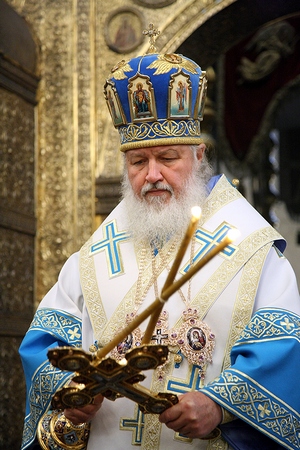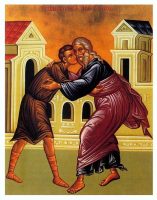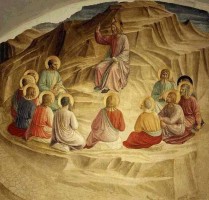28 August 2009
In the Name of the Father and of the Son and of the Holy Spirit.
Today is one of the most important of the Twelve Great Feasts. We glorify the Dormition of the Most Holy Mother of God.
There was no human honour or glory in the life of the Queen of Heaven. And the only event linked with Her earthly life, surrounded by honour and glory, is Her falling asleep. We know about the Dormition of the Most Holy Mother of God from the Tradition of the Church, from reliable testimonies of the ancient Church Fathers, starting with St Dionysius the Areopagite and Melito of Sardis as well as St Epiphanius of Cyprus, St Ambrose of Milan and St Juvenal, Patriarch of Jerusalem. The first five centuries of Christian history already commemorate in a great many detailed accounts the earthly life of the Most Holy Mother of God and Her Dormition.
 On the day of the glory of Most Holy Mother of God – Her falling asleep and the reception of Her body into heaven by Divine power – the Church offers for our reflection the epistle of the Apostle Paul to the Philippians, which would seem not in any way to be connected with the life of the Mother of God. But this is only at first sight. We have just heard the remarkable words which the Apostle addresses to the Church of Philippi, speaking of the Saviour Himself, that He emptied Himself, and took upon Him the form of a servant, and was made in the likeness of men: and being found in fashion as a man, He humbled Himself, and became obedient unto death, even the death of the cross’ (See Philippians 2, 7-9).
On the day of the glory of Most Holy Mother of God – Her falling asleep and the reception of Her body into heaven by Divine power – the Church offers for our reflection the epistle of the Apostle Paul to the Philippians, which would seem not in any way to be connected with the life of the Mother of God. But this is only at first sight. We have just heard the remarkable words which the Apostle addresses to the Church of Philippi, speaking of the Saviour Himself, that He emptied Himself, and took upon Him the form of a servant, and was made in the likeness of men: and being found in fashion as a man, He humbled Himself, and became obedient unto death, even the death of the cross’ (See Philippians 2, 7-9).
Why today, on the feast of the Dormition of the Most Holy Mother of God, is this passage about humbling, the self-humbling, of the Saviour given to us for our edification? It is not at all a coincidence because humility was at the heart of the life of the Most Holy Mother of God. From the remarkable accounts of the personality, way of life and communion with others of the Mother of God given by the Church Fathers, we have Her wonderful image. In his ‘Treatise on Virgins’ St Ambrose of Milan speaks in detail of the Mother of God. Drawing on precise information about Her life taken from the Tradition of the Church, he speaks of the way She related to others. She never spoke in a loud voice, She never annoyed anyone, She never tried to browbeat others with words, She never exalted Herself, She never offended anyone. Her words were quiet, calm, peace-making, bearing in themselves an immense inner strength.
As for the outward appearance of the Mother of God, it is stamped on icons, because the first iconographer to reflect Her most pure countenance was the Apostle Luke, he who, as we would say today, painted from nature. Before him was the Most Pure Virgin Mary and we can see how beautiful this human countenance was, all penetrated by Divine power.
We have even inherited accounts of how the Mother of God dressed. Her clothes were of a natural colour, modest, but at the same time they seemed to witness to Her inner purity.
Here is the outward image of the Mother of God, these are the remarkable testimonies of the Holy Fathers about how She conducted Herself in Her dealings with others – so closely linked with the epistle of the Apostle Paul to the Philippians: and She humbled Herself and She became like anyone else! Humility was at the core of the testimony She gave through Her personality to those around Her Son and God.
These instructive testimonies about the Mother of God force us modern people to stop and think. Quite possibly one of the major problems of contemporary pseudo-culture is the way in which people relate to one another. All we have to do is to listen attentively to how people behave towards each other. How often here we see rudeness, the desire to conquer a rival, or even anyone we have dealings with, through strong and forceful words, to show them our strength, our importance! How often people simply brag, lie, create word pictures of their lives and importance which do not at all correspond to reality! How often we use rudeness, trying to crush others with words, how easily we insult each other! A great many conflicts which come about through our dealings with others are connected with words. Words kill, words annoy, words give rise to huge clashes between people. If we look at what today plays such an important role in moulding people, films, TV programmes, especially the social debates on so-called topical issues! What is there more of here – wisdom or scandal, what is there more of here – attempts to unearth the truth or to show off in front of the whole country and the whole world: ‘What a clever person I am, look how strong I am and how I polish off my opponent’? These are examples of how people do harm.
An example of how we should relate to others is the Mother of God. Why? Because we show who we really are, through humility, through a calm word, through a sincere word.
People tend to puff themselves up and pose in order to convince others of their importance. Usually it is an inner emptiness, an absence of thought which is concealed behind this attempt to convince others outwardly, behind the attempts to make an impression which does not correspond to reality. This is a sort of artificial power, an artificial way of conquering others, of asserting ourselves. Just as people depend on power and money, so they depend on the outward signs of life, so they can attain their aims and, above all, raise themselves above others by emphasising their own importance.
The conduct of the Mother of God is a great example to us all: She revealed in Herself a really ideal image of humanity, which does not depend on some outward force, but on an inner strength which convinces everyone. The Mother of God is an example of humility and purity, an ideal of human life, and this ideal is very far from the ideal which is on offer to us today and is becoming part of the consciousness of many. How far away all this is, what a huge distance there is! But what can we do? Dismiss this distance and simply live like everyone else? Shout, make a noise, browbeat, argue, lie puff ourselves up, use the outward signs of our position to lord it over others, thus revealing our weakness and not our strength? Contemporary humanity can be compared with tinsel which is shiny, but which does not have any real value. We use a huge amount of energy to produce the shine on the outside, but there is no light inside it. And so the shine is artificial, it is not useful to anyone and actually it is soul-destroying.
The example of the Mother of God is today a great example for contemporary humanity. And we must not dismiss the problem, we must realise the difference between the ideal and real life. We must ask the Lord to teach us, to give us the strength to acquire humility, to give us the wisdom to build correct relationships with others, to give us the ability to control our words so that these words do not hurt, annoy or kill anyone. The Queen of Heaven really does give us the strongest and clearest direction in life and we cannot help seeing this direction. May the image of the Queen of Heaven help contemporary humanity, hesitant and erring, to understand that there are real values in life, and to build our lives not in accordance with passing ideas, which some fashion or faddish lifestyle impose on us, but in accordance with the eternal and unfailing truths which God Himself offers mankind for his happiness and well-being.
It is precisely the holy life of the Mother of God which explains why the Most Pure Virgin became higher than the angels and archangels, higher than all the saints. And this is echoed here again in today’s epistle reading: Wherefore God also has highly exalted Him, and given Him a name which is above every name! So it was said of the Lord Jesus Christ, Who emptied Himself, and took upon Him the form of a servant. The same can be said of the Most Pure Virgin, Who acquired great glory through humility and it is Her Most Pure Dormition which is the symbol of this glory. She died, died by dint of the laws of human existence, but her immortal soul and body were taken up by God into His glory. And today, praying to the Mother of God, asking for Her help and intercession, we must never forget the wonderful image of humanity which the Most Holy Virgin has revealed for the edification of us all. Amen.
Translated from Russian by Fr. Andrew Phillips



















